Nursing Reflection: Analyzing Personal Perspective on Death & Illness
VerifiedAdded on 2023/06/14
|5
|1279
|461
Journal and Reflective Writing
AI Summary
This nursing reflection explores personal perceptions and meanings of death, dying, and illness within a specialized nursing practice. It delves into emotional triggers, such as denial and shock, experienced upon the sudden loss of a loved one or the diagnosis of a fatal disease. Drawing from the blog "A Reflection on Death, Dying, and Illness," the reflection connects these experiences to the theory of post-traumatic stress disorder (PTSD) and emphasizes the importance of person-centered care. It acknowledges the diverse expressions of grief and the challenges individuals face in coping with loss and terminal illness. The reflection highlights the need for emotional support, empathy, and compassion in palliative care, while also recognizing the significance of educating patients and families about diseases and medical advancements. Ultimately, it concludes that a person-centered approach, incorporating sympathy, empathy, and compassion, is crucial for supporting individuals and families through end-of-life care and chronic illnesses, and students can find more resources like this on Desklib.
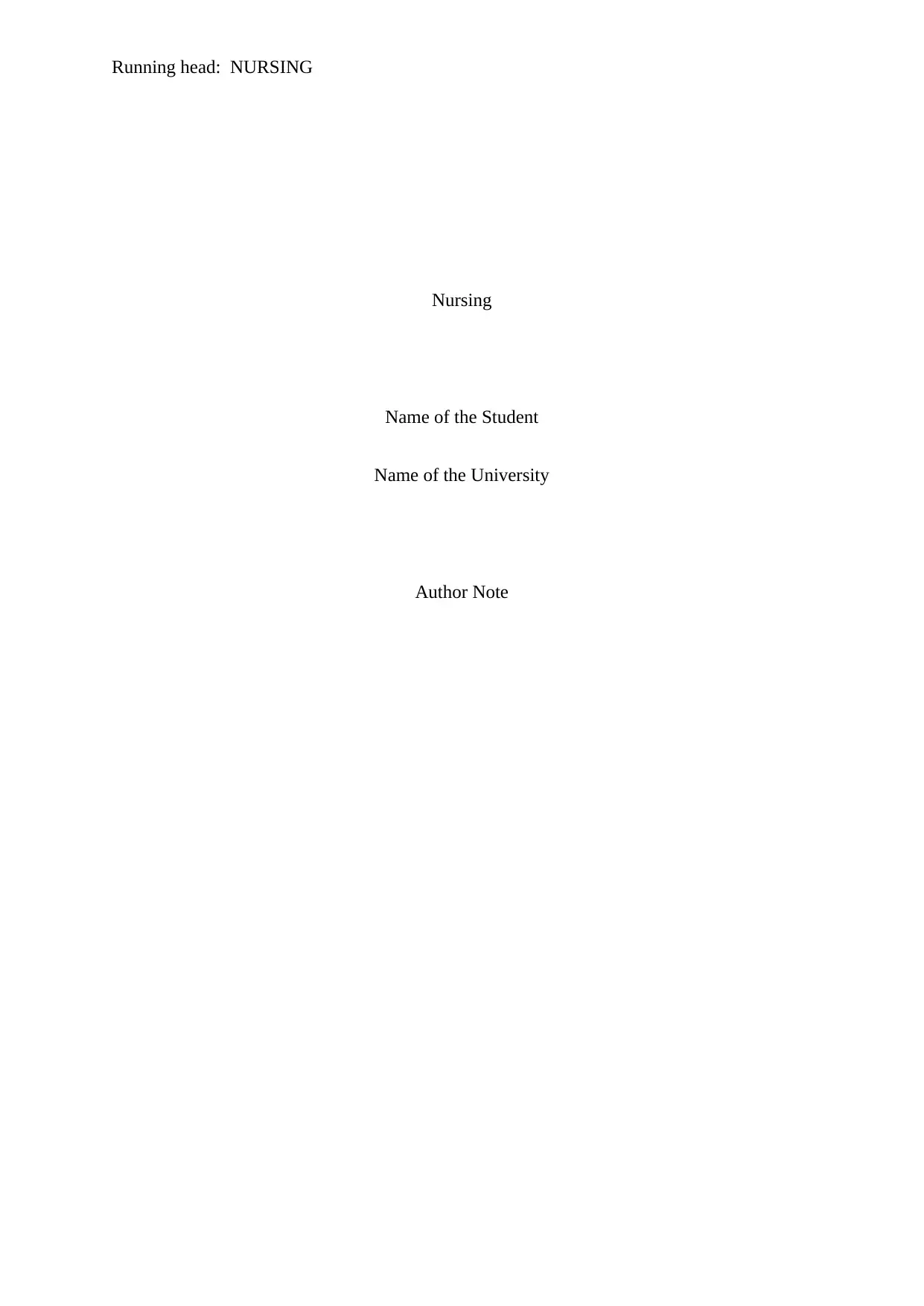
Running head: NURSING
Nursing
Name of the Student
Name of the University
Author Note
Nursing
Name of the Student
Name of the University
Author Note
Paraphrase This Document
Need a fresh take? Get an instant paraphrase of this document with our AI Paraphraser
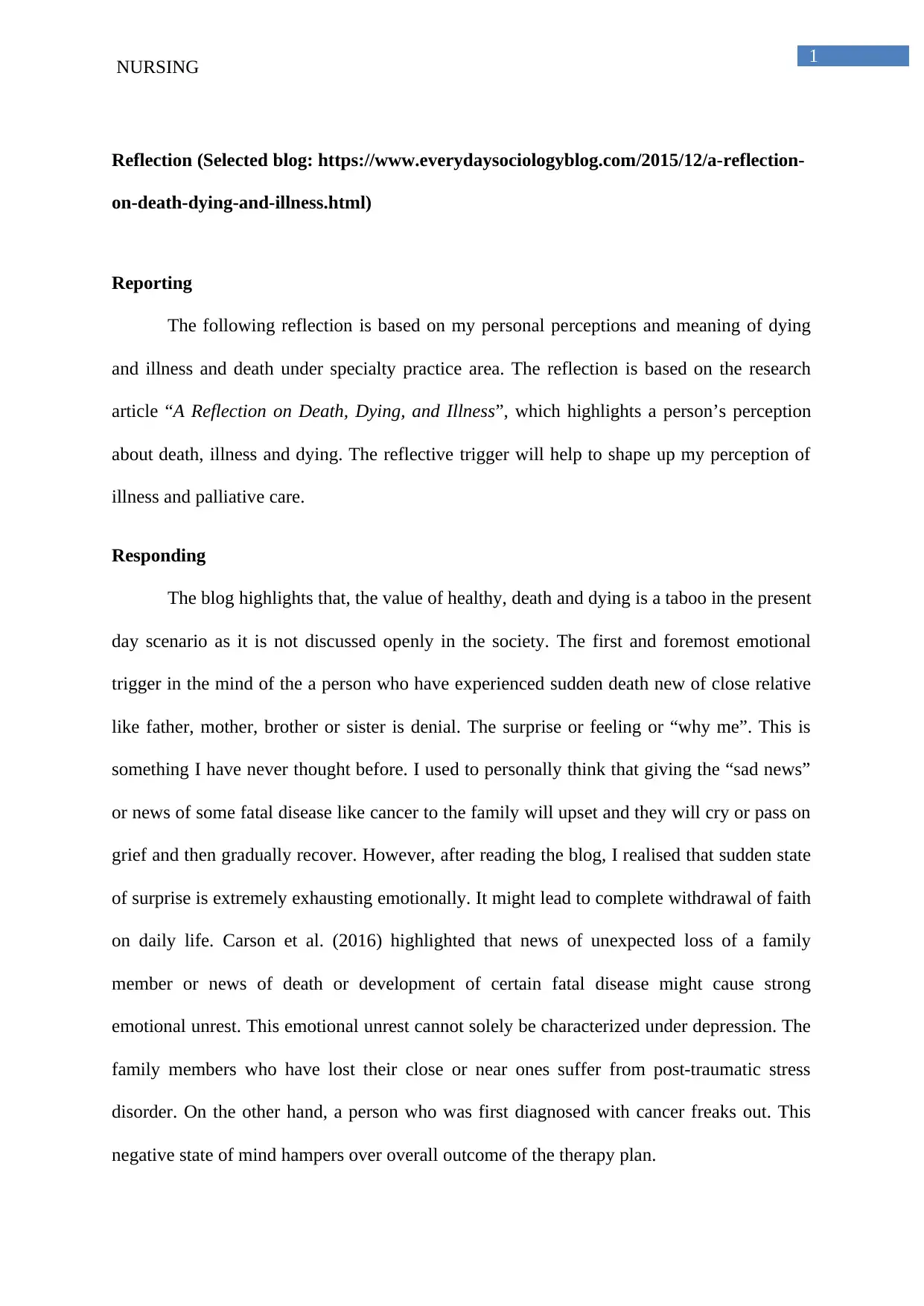
1
NURSING
Reflection (Selected blog: https://www.everydaysociologyblog.com/2015/12/a-reflection-
on-death-dying-and-illness.html)
Reporting
The following reflection is based on my personal perceptions and meaning of dying
and illness and death under specialty practice area. The reflection is based on the research
article “A Reflection on Death, Dying, and Illness”, which highlights a person’s perception
about death, illness and dying. The reflective trigger will help to shape up my perception of
illness and palliative care.
Responding
The blog highlights that, the value of healthy, death and dying is a taboo in the present
day scenario as it is not discussed openly in the society. The first and foremost emotional
trigger in the mind of the a person who have experienced sudden death new of close relative
like father, mother, brother or sister is denial. The surprise or feeling or “why me”. This is
something I have never thought before. I used to personally think that giving the “sad news”
or news of some fatal disease like cancer to the family will upset and they will cry or pass on
grief and then gradually recover. However, after reading the blog, I realised that sudden state
of surprise is extremely exhausting emotionally. It might lead to complete withdrawal of faith
on daily life. Carson et al. (2016) highlighted that news of unexpected loss of a family
member or news of death or development of certain fatal disease might cause strong
emotional unrest. This emotional unrest cannot solely be characterized under depression. The
family members who have lost their close or near ones suffer from post-traumatic stress
disorder. On the other hand, a person who was first diagnosed with cancer freaks out. This
negative state of mind hampers over overall outcome of the therapy plan.
NURSING
Reflection (Selected blog: https://www.everydaysociologyblog.com/2015/12/a-reflection-
on-death-dying-and-illness.html)
Reporting
The following reflection is based on my personal perceptions and meaning of dying
and illness and death under specialty practice area. The reflection is based on the research
article “A Reflection on Death, Dying, and Illness”, which highlights a person’s perception
about death, illness and dying. The reflective trigger will help to shape up my perception of
illness and palliative care.
Responding
The blog highlights that, the value of healthy, death and dying is a taboo in the present
day scenario as it is not discussed openly in the society. The first and foremost emotional
trigger in the mind of the a person who have experienced sudden death new of close relative
like father, mother, brother or sister is denial. The surprise or feeling or “why me”. This is
something I have never thought before. I used to personally think that giving the “sad news”
or news of some fatal disease like cancer to the family will upset and they will cry or pass on
grief and then gradually recover. However, after reading the blog, I realised that sudden state
of surprise is extremely exhausting emotionally. It might lead to complete withdrawal of faith
on daily life. Carson et al. (2016) highlighted that news of unexpected loss of a family
member or news of death or development of certain fatal disease might cause strong
emotional unrest. This emotional unrest cannot solely be characterized under depression. The
family members who have lost their close or near ones suffer from post-traumatic stress
disorder. On the other hand, a person who was first diagnosed with cancer freaks out. This
negative state of mind hampers over overall outcome of the therapy plan.
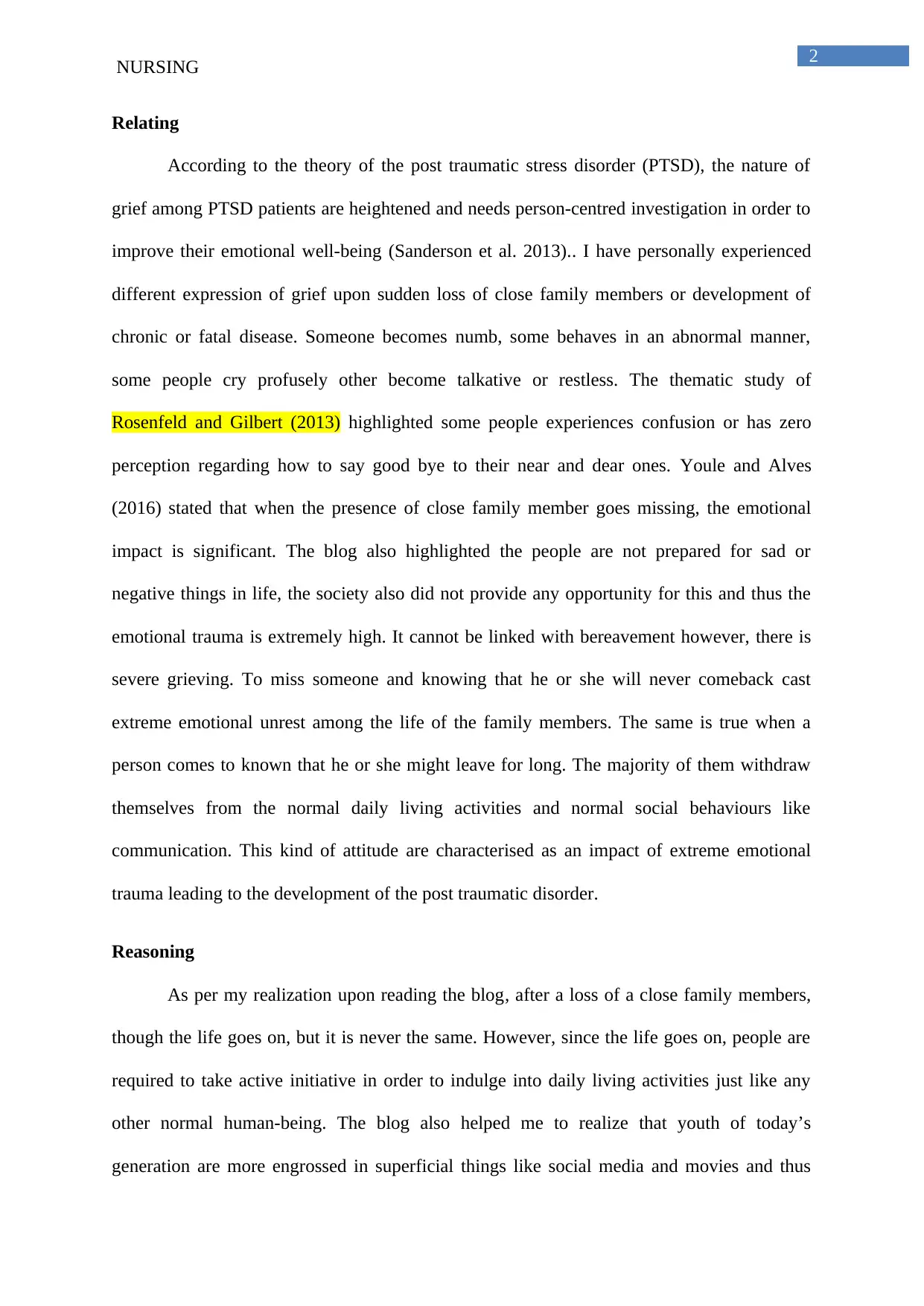
2
NURSING
Relating
According to the theory of the post traumatic stress disorder (PTSD), the nature of
grief among PTSD patients are heightened and needs person-centred investigation in order to
improve their emotional well-being (Sanderson et al. 2013).. I have personally experienced
different expression of grief upon sudden loss of close family members or development of
chronic or fatal disease. Someone becomes numb, some behaves in an abnormal manner,
some people cry profusely other become talkative or restless. The thematic study of
Rosenfeld and Gilbert (2013) highlighted some people experiences confusion or has zero
perception regarding how to say good bye to their near and dear ones. Youle and Alves
(2016) stated that when the presence of close family member goes missing, the emotional
impact is significant. The blog also highlighted the people are not prepared for sad or
negative things in life, the society also did not provide any opportunity for this and thus the
emotional trauma is extremely high. It cannot be linked with bereavement however, there is
severe grieving. To miss someone and knowing that he or she will never comeback cast
extreme emotional unrest among the life of the family members. The same is true when a
person comes to known that he or she might leave for long. The majority of them withdraw
themselves from the normal daily living activities and normal social behaviours like
communication. This kind of attitude are characterised as an impact of extreme emotional
trauma leading to the development of the post traumatic disorder.
Reasoning
As per my realization upon reading the blog, after a loss of a close family members,
though the life goes on, but it is never the same. However, since the life goes on, people are
required to take active initiative in order to indulge into daily living activities just like any
other normal human-being. The blog also helped me to realize that youth of today’s
generation are more engrossed in superficial things like social media and movies and thus
NURSING
Relating
According to the theory of the post traumatic stress disorder (PTSD), the nature of
grief among PTSD patients are heightened and needs person-centred investigation in order to
improve their emotional well-being (Sanderson et al. 2013).. I have personally experienced
different expression of grief upon sudden loss of close family members or development of
chronic or fatal disease. Someone becomes numb, some behaves in an abnormal manner,
some people cry profusely other become talkative or restless. The thematic study of
Rosenfeld and Gilbert (2013) highlighted some people experiences confusion or has zero
perception regarding how to say good bye to their near and dear ones. Youle and Alves
(2016) stated that when the presence of close family member goes missing, the emotional
impact is significant. The blog also highlighted the people are not prepared for sad or
negative things in life, the society also did not provide any opportunity for this and thus the
emotional trauma is extremely high. It cannot be linked with bereavement however, there is
severe grieving. To miss someone and knowing that he or she will never comeback cast
extreme emotional unrest among the life of the family members. The same is true when a
person comes to known that he or she might leave for long. The majority of them withdraw
themselves from the normal daily living activities and normal social behaviours like
communication. This kind of attitude are characterised as an impact of extreme emotional
trauma leading to the development of the post traumatic disorder.
Reasoning
As per my realization upon reading the blog, after a loss of a close family members,
though the life goes on, but it is never the same. However, since the life goes on, people are
required to take active initiative in order to indulge into daily living activities just like any
other normal human-being. The blog also helped me to realize that youth of today’s
generation are more engrossed in superficial things like social media and movies and thus
⊘ This is a preview!⊘
Do you want full access?
Subscribe today to unlock all pages.

Trusted by 1+ million students worldwide
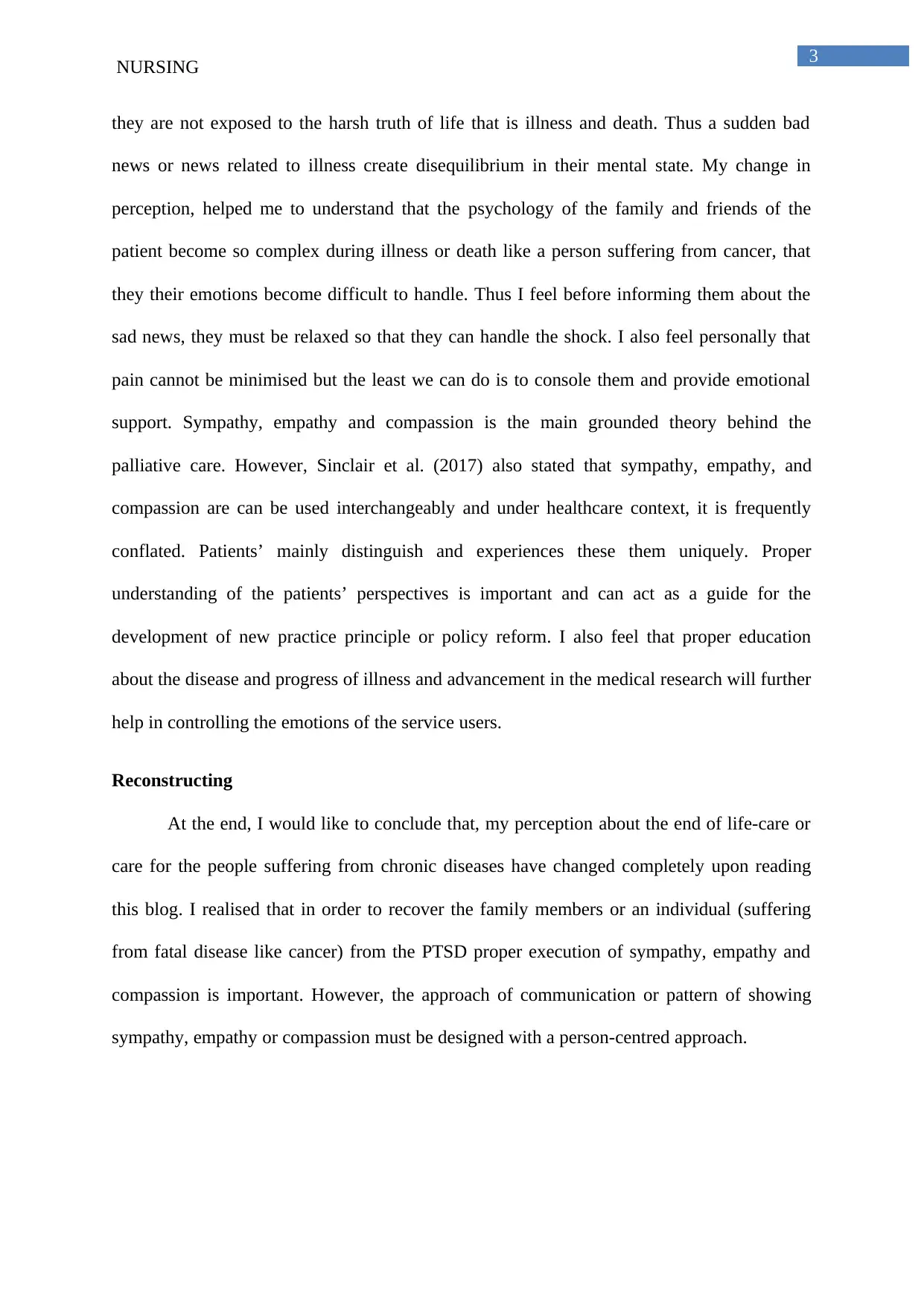
3
NURSING
they are not exposed to the harsh truth of life that is illness and death. Thus a sudden bad
news or news related to illness create disequilibrium in their mental state. My change in
perception, helped me to understand that the psychology of the family and friends of the
patient become so complex during illness or death like a person suffering from cancer, that
they their emotions become difficult to handle. Thus I feel before informing them about the
sad news, they must be relaxed so that they can handle the shock. I also feel personally that
pain cannot be minimised but the least we can do is to console them and provide emotional
support. Sympathy, empathy and compassion is the main grounded theory behind the
palliative care. However, Sinclair et al. (2017) also stated that sympathy, empathy, and
compassion are can be used interchangeably and under healthcare context, it is frequently
conflated. Patients’ mainly distinguish and experiences these them uniquely. Proper
understanding of the patients’ perspectives is important and can act as a guide for the
development of new practice principle or policy reform. I also feel that proper education
about the disease and progress of illness and advancement in the medical research will further
help in controlling the emotions of the service users.
Reconstructing
At the end, I would like to conclude that, my perception about the end of life-care or
care for the people suffering from chronic diseases have changed completely upon reading
this blog. I realised that in order to recover the family members or an individual (suffering
from fatal disease like cancer) from the PTSD proper execution of sympathy, empathy and
compassion is important. However, the approach of communication or pattern of showing
sympathy, empathy or compassion must be designed with a person-centred approach.
NURSING
they are not exposed to the harsh truth of life that is illness and death. Thus a sudden bad
news or news related to illness create disequilibrium in their mental state. My change in
perception, helped me to understand that the psychology of the family and friends of the
patient become so complex during illness or death like a person suffering from cancer, that
they their emotions become difficult to handle. Thus I feel before informing them about the
sad news, they must be relaxed so that they can handle the shock. I also feel personally that
pain cannot be minimised but the least we can do is to console them and provide emotional
support. Sympathy, empathy and compassion is the main grounded theory behind the
palliative care. However, Sinclair et al. (2017) also stated that sympathy, empathy, and
compassion are can be used interchangeably and under healthcare context, it is frequently
conflated. Patients’ mainly distinguish and experiences these them uniquely. Proper
understanding of the patients’ perspectives is important and can act as a guide for the
development of new practice principle or policy reform. I also feel that proper education
about the disease and progress of illness and advancement in the medical research will further
help in controlling the emotions of the service users.
Reconstructing
At the end, I would like to conclude that, my perception about the end of life-care or
care for the people suffering from chronic diseases have changed completely upon reading
this blog. I realised that in order to recover the family members or an individual (suffering
from fatal disease like cancer) from the PTSD proper execution of sympathy, empathy and
compassion is important. However, the approach of communication or pattern of showing
sympathy, empathy or compassion must be designed with a person-centred approach.
Paraphrase This Document
Need a fresh take? Get an instant paraphrase of this document with our AI Paraphraser
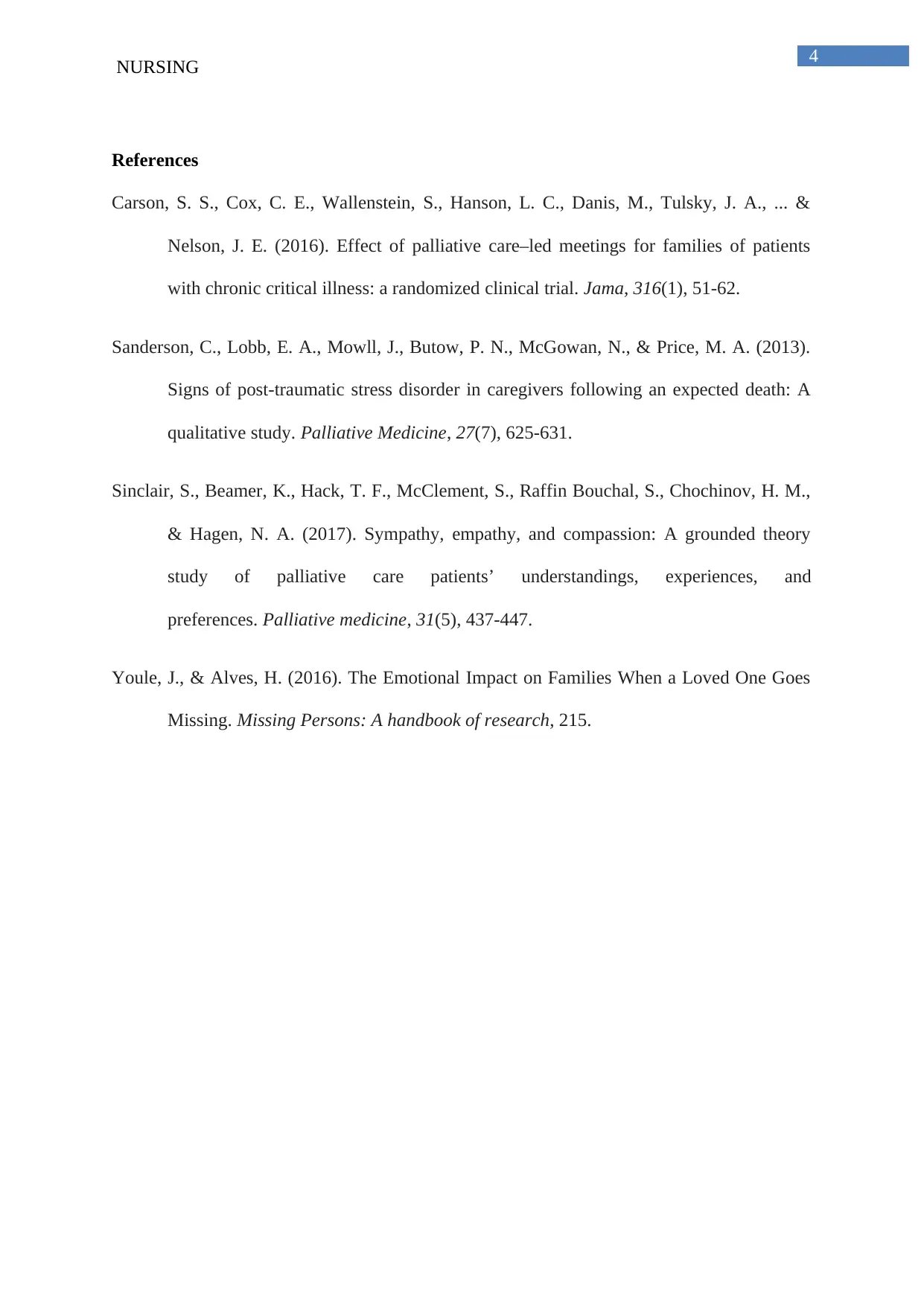
4
NURSING
References
Carson, S. S., Cox, C. E., Wallenstein, S., Hanson, L. C., Danis, M., Tulsky, J. A., ... &
Nelson, J. E. (2016). Effect of palliative care–led meetings for families of patients
with chronic critical illness: a randomized clinical trial. Jama, 316(1), 51-62.
Sanderson, C., Lobb, E. A., Mowll, J., Butow, P. N., McGowan, N., & Price, M. A. (2013).
Signs of post-traumatic stress disorder in caregivers following an expected death: A
qualitative study. Palliative Medicine, 27(7), 625-631.
Sinclair, S., Beamer, K., Hack, T. F., McClement, S., Raffin Bouchal, S., Chochinov, H. M.,
& Hagen, N. A. (2017). Sympathy, empathy, and compassion: A grounded theory
study of palliative care patients’ understandings, experiences, and
preferences. Palliative medicine, 31(5), 437-447.
Youle, J., & Alves, H. (2016). The Emotional Impact on Families When a Loved One Goes
Missing. Missing Persons: A handbook of research, 215.
NURSING
References
Carson, S. S., Cox, C. E., Wallenstein, S., Hanson, L. C., Danis, M., Tulsky, J. A., ... &
Nelson, J. E. (2016). Effect of palliative care–led meetings for families of patients
with chronic critical illness: a randomized clinical trial. Jama, 316(1), 51-62.
Sanderson, C., Lobb, E. A., Mowll, J., Butow, P. N., McGowan, N., & Price, M. A. (2013).
Signs of post-traumatic stress disorder in caregivers following an expected death: A
qualitative study. Palliative Medicine, 27(7), 625-631.
Sinclair, S., Beamer, K., Hack, T. F., McClement, S., Raffin Bouchal, S., Chochinov, H. M.,
& Hagen, N. A. (2017). Sympathy, empathy, and compassion: A grounded theory
study of palliative care patients’ understandings, experiences, and
preferences. Palliative medicine, 31(5), 437-447.
Youle, J., & Alves, H. (2016). The Emotional Impact on Families When a Loved One Goes
Missing. Missing Persons: A handbook of research, 215.
1 out of 5
Related Documents
Your All-in-One AI-Powered Toolkit for Academic Success.
+13062052269
info@desklib.com
Available 24*7 on WhatsApp / Email
![[object Object]](/_next/static/media/star-bottom.7253800d.svg)
Unlock your academic potential
Copyright © 2020–2025 A2Z Services. All Rights Reserved. Developed and managed by ZUCOL.




